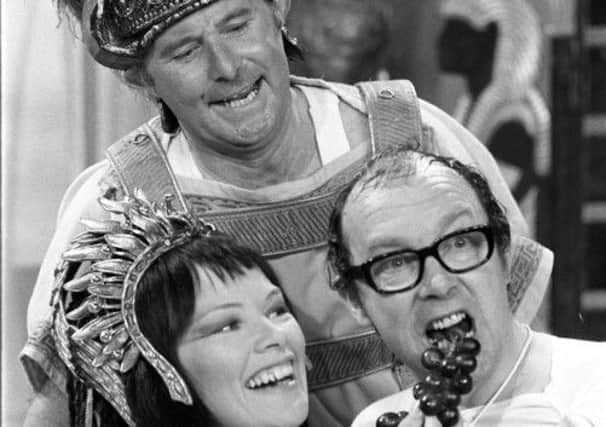Morecambe and Wise writer Eddie Braben dies


His manager, Norma Farnes, said Mr Braben, who also wrote for Ken Dodd, died following a short illness.
Speaking yesterday of Mr Braben’s contribution to British comedy, Ms Farnes said: “It was [TV producer] Billy Cotton Jnr at the BBC who recognised that the brilliance of Eddie’s writing was the ideal marriage that would guarantee the success of Morecambe and Wise.
Advertisement
Hide AdAdvertisement
Hide Ad“He is survived by his loving wife Dee, three children and six grandchildren.”
Tributes to the writer’s comic genius poured in.
Sir Bruce Forsyth, who worked with Mr Braben on Play Your Cards Right, said: “This is sad news, it really is. He was a fantastic writer.”
The Strictly Come Dancing host said he was surprised to hear of the comedian’s death, because he had recently seen him and he had “looked fine”.
Paying tribute to Mr Braben’s work, he said: “What he did for Eric [Morecambe] and Ernie [Wise] was incredible. He was the third man of the comedy.
“I wish I could have been doing the kind of shows he had written. His jokes and style of writing will be sorely missed in the business.”
David Baddiel – in a reference to one of Mr Braben’s best-known sketches – called him a “man who, comically, played all the right notes, in the right order, all the time”.
Ms Farnes described her colleague as a man of integrity. She added: “Eddie was a very humble man, a very quiet man and a very private man. He had a lot of integrity, which is in short supply in this business.
“I have to say, and he would have disagreed with this, that writing came easy to him, even on bad days – when he was writing Christmas shows for Eric and Ernie and he was under great pressure.
Advertisement
Hide AdAdvertisement
Hide Ad“As Eric Sykes used to say, when you’re a writer, you’re a writer 24 hours of the day. That applies to Eddie very much. He was a great observationist.”
Mr Braben was credited with contributing to the huge success of Morecambe and Wise by introducing comic elements of their off-stage relationship into the act.
He is also famed for writing for comedy greats such as David Frost and Ronnie Corbett.
He started writing with Morecambe and Wise in 1969, when he was invited to work for the BBC by the head of light entertainment, Bill Cotton.
Mr Braben became a full-time comedy writer in the 1950s, and produced scripts for many of the comedians of the time, including fellow Liverpudlian Dodd.
He worked with Dodd for nearly 15 years before being lured to work at the BBC. His first experience of Morecambe and Wise was as a teenager when he saw them perform at the Liverpool Empire.
A few of Braben’s best gags
AMONG the most memorable of all Eddie Braben’s gags was that involving Grieg’s Piano Concerto.
In the skit, Eric Morecambe insists that he will perform the piece under the baton of André Previn, whom he misnames and insults.
Advertisement
Hide AdAdvertisement
Hide AdThe performance goes as badly, as viewers would expect, culminating in the line: “I am playing all the notes. Just not necessarily in the right
order”.
Braben’s irreverent sense of humour meant celebrity appearances were a gift to his writing talents.
Glenda Jackson, right, in a sketch based round Ern’s production of Antony and Cleopatra, was given the line, to be uttered with utmost grandeur: “All men are fools, and what makes them so is having beauty like what I have got.”
In another celebrity sketch, the hugely respected violinist Yehudi Menuhin was told he could not appear on the show without his
banjo.
Braben was also renowned for his use of rhythm and timing in his jokes, such as the lines he wrote for Ken Dodd, set out like the separate lines of a song: “When I was at school,/ I used to be teacher’s pet./ I sat in a cage at the back of the class.”
At times, the writer could indulge in mildly risqué puns, such as when Morecambe was asked, in a Roman sketch, if he had “the scrolls”, and replied: “No, I always walk this way.”
However, Braben’s humour could also be deceptively simple, using basic observations to turn everyday situations into moments of comedy genius. In a bungalow sketch, Eric hears the siren of an emergency vehicle squealing past and comments: “He won’t sell many ice-creams going at that speed.”